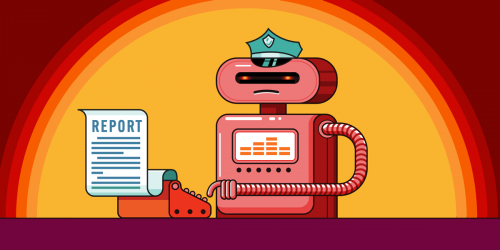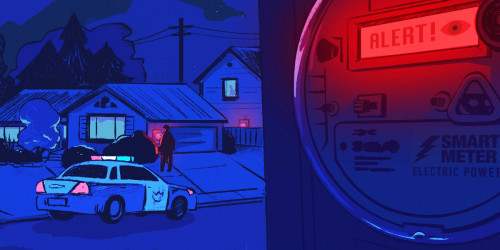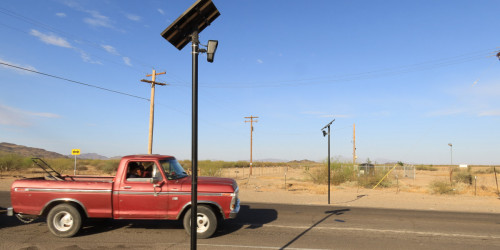EFF has joined a coalition of civil rights, immigration, and criminal justice reform organizations to demand the California Department of Justice (CADOJ) place an immediate moratorium on the use of the state’s gang database, also known as CalGang.
For years, EFF has stood beside many of these organizations to advocate for reforms to the CalGang system, which has tarnished the records of countless Californians—largely Black and Latinx—by connecting them to gangs based on the thinnest of evidence. Indeed, sometimes the information has been falsified, as was revealed to be the case with the Los Angeles Police Department (LAPD) earlier this year. In previous legislative sessions, we supported multiple pieces of legislation by Assemblymember Shirley Weber to overhaul CalGang. However, the CADOJ has missed many of the deadlines created by these statutes, so it’s clear that simply hoping for reform isn’t enough. Just as LAPD suspended its use of gang databases this month, use of CalGang must come to a dead stop until, at minimum, CADOJ fully implements reforms required by existing legislation. EFF also supports the abolition of CalGang altogether.
Below is the text of the letter signed by the coalition of gang-database activists, as well as members of the technical advisory board set up by the state to provide guidance on CalGang.
Dear Attorney General Becerra,
Since the murder of George Floyd, Californians have taken to the streets to express their outrage and grief, but most importantly to state that Black Lives Matter. Millions of people exercising their First Amendment rights these past weeks have demonstrated the insufficiency of the California Department of Justice’s actions to meet their longstanding demand that law enforcement treat everyone with respect and dignity. Nowhere is that more true than in the Department’s ineffective effort to reform law enforcement’s use of the CalGang database.
To remedy this, we the undersigned organizations and individuals demand the Department must immediately place a moratorium on the use of CalGang Database until (1) regulations for its use are adopted, (2) trainings are developed with purposeful community input and approved by the Department, and (3) all users have completed these trainings.
On October 12, 2017, the Legislature chaptered AB 90, assigning to the Department the task of regulating law enforcement agencies’ use of shared gang databases, with instruction to adopt rules that would address the racially-biased overinclusion of Black people and other people of color. The Legislature gave the Department a deadline of January 1, 2020 to accomplish this task. As of the date of this letter, regulations have yet to be adopted. The Department’s most recent Revisions to Proposed Regulations (OAL Register 2019-0430-06) delete even the Department’s revised deadline of July 1, 2020 without offering any new date. In the meantime, the CalGang database continues to be utilized by law enforcement agencies under the old policies and practices which the Legislature expressly found unacceptable in 2017. Furthermore, the currently proposed regulations have prioritized codifying the existing criteria and practices of law enforcement agencies that led to the criminalization of Black and Latino Californians over the Legislature’s stated goal of shielding communities from this unnecessary labeling and its dangerous effects.
CalGang is emblematic of the type of policing that has directly led to the recent unrest throughout the country. Gang units and other patrols fan out across communities, target Black people and other people of color, stop them under pretexts like a traffic stop or a supposedly “consensual” stop, use racist stereotypes to deem them “gang members,” and add their names and information into the database to be tracked. Police then use these gang labels to justify further stops, interrogations, uses of force, and enhanced punishment. The Department has yet to accomplish anything to eradicate this practice despite the Legislature’s instruction and statutory grant of authority to do exactly that. To the contrary, it has affirmatively rejected amendments grounded in empirical evidence and community input that would limit the likelihood of harm inflicted upon communities of color.
While many of us believe that all law enforcement gang databases must be abolished, a moratorium until the Department has fully implemented reforms that are consistent with its legislative grant of power is a reasonable and appropriate step that the Department can immediately take while abolition of gang databases is considered by the broader group of stakeholders. The Department has little excuse not to take this step. In 2018, the legislature imposed a moratorium with no negative consequences. Currently, the Los Angeles Police Department, CalGang’s largest user, has imposed a second moratorium on their department’s use of CalGang - spurred by the recognition that some entries lack a factual basis and are driven by harmful presumptions based at least in part upon race, and after finally acknowledging the damaging effects of continued use of this system, particularly upon the Black community.
The Department can no longer allow CalGang to continue under the unacceptable old policies and procedures while the Department misses deadline after deadline, deferring reform. Now is the time for the Department to recognize that truth, and alongside community partners take immediate concrete actions by enacting an immediate moratorium on all use of CalGang. The Department should also take this moment to revisit the proposed regulations and adopt rules for the use of CalGang that provide real protections to the communities wrongly targeted by gang labeling for far too long.
Sincerely,
ACLU of California
Coalition for Humane Immigrant Rights (CHIRLA)
Loyola Immigrant Justice Clinic
Urban Peace Institute
Sammy Nunez - Gang Database Technical Advisory Committee
Chair Marissa Montes – Gang Database Technical Advisory Committee
Jeremy Thornton – Gang Database Technical Advisory Committee
Paul Carrillo – Gang Database Technical Advisory Committee
Michael Scaffidi – Gang Database Technical Advisory Committee
2nd Call Anti-Recidivism Coalition
Asian Americans Advancing Justice - CA
Asian Americans Advancing Justice - Los Angeles
Breaking Through Barriers to Success California
Alliance for Youth and Community Justice (CAYCJ)
California Attorneys for Criminal Justice Californians for Safety and Justice
California Immigrant Policy Center Central American Resource Center (CARECEN)
Chicanxs Unidos
Chispa Community Advocates for Just and Moral Governance (MoGo)
Consumer Attorneys of California
Criminal Justice Clinic, UC Irvine School of Law
Detours Mentoring Group, Inc.
Electronic Frontier Foundation
Ella Baker Center for Human Rights
Fathers & Families of San Joaquin
Friends Committee on Legislation of California
Ground Game LA
H.E.L.P.E.R. Foundation
Healing Hearts Restoring
Hope Homeboy Industries
Homies Unidos
Immigrant Defense Advocates
Immigrant Legal Resource Center
Latino Coalition for a Healthy California
National Association of Social Workers (NASW) California Chapter
PICO California
Project Kinship
Promesa Boyle Heights
Public Counsel
Restore Justice
Southern California Cease Fire Committee
Southern California Crossroads
UC Irvine School of Law Immigrant Rights Clinic
Young Visionaries
Youth Leadership Academy













